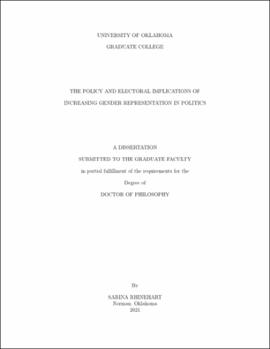| dc.contributor.advisor | Crespin, Michael | |
| dc.contributor.author | Rhinehart, Sarina | |
| dc.date.accessioned | 2021-05-14T15:11:41Z | |
| dc.date.available | 2021-05-14T15:11:41Z | |
| dc.date.issued | 2021-05-14 | |
| dc.identifier.uri | https://hdl.handle.net/11244/329564 | |
| dc.description.abstract | Despite more than a century since the first woman was elected to the U.S. Congress and women gained the right to vote, women remain underrepresented in Washington D.C., making up only about a quarter of lawmakers. In three separate articles, this dissertation examines gender representation in government and how the multiple identities of women candidates and politicians impact their electoral experiences and legislative behaviors. This dissertation examines how gender intersects with parental status, marital status, sexuality, race, and political party to shape women's experiences seeking and serving in political office. I find that while women continue to face obstacles in pursuing elected office and in achieving their preferred policy outcomes in government, there are also opportunities for women and other underrepresented groups to gain and exercise political power. | en_US |
| dc.language | en | en_US |
| dc.subject | Gender | en_US |
| dc.subject | Representation | en_US |
| dc.subject | Intersectionality | en_US |
| dc.title | The policy and electoral implications of increasing gender representation in politics | en_US |
| dc.contributor.committeeMember | Finocchiaro, Charles | |
| dc.contributor.committeeMember | Shortle, Allyson | |
| dc.contributor.committeeMember | Edy, Jill | |
| dc.contributor.committeeMember | Israel-Trummel, Mackenzie | |
| dc.date.manuscript | 2021-05-13 | |
| dc.thesis.degree | Ph.D. | en_US |
| ou.group | College of Arts and Sciences::Department of Political Science | en_US |
| shareok.orcid | https://orcid.org/0000-0001-9475-5460 | en_US |
